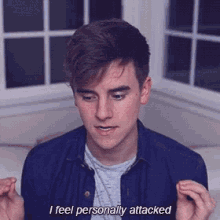Inherent problem in fisking everything is trying to hold multiple conversations with people.
I think you mean the other way around? Haha.
I think you can be more specific (in covering the problems, that is, and I'm speaking in the general "you" and not literally you). The thing doesn't need to be 8 pages, but I think you can cover a decent amount of ground in a few paragraphs.
But what's wrong with a general disclaimer, then supported by an article or two that offer a perspective on specifics? Being more specific about every single disclaimer both has an element of proselytizing, and also opens a ton of cans of worms.
I mean maybe you're right, and that's just the direction we need to go in. Open up the can, and try to sort it all out; have the conversation. I mean, that's happening already. But more specifically, how much does WotC need to be involved?
I think it would be helpful to Wizards to put articles up, but make them be from people who understand this stuff. I don't think you need Jeremy Crawford putting out VLogs, but people who have experienced these feelings over the years. To me, I think you have to lead the community, and I think that's a great way to do it.
OK, I'm fine with it, although I can easily see how this could go wrong, so I would "handle it with care." Meaning, be sure not to be too heavy-handed on "OneTrueInterpretation."
I don't think that utilitarian argument works at this point: the horse is out of the barn and across the county. Those arguments have been ongoing for a while now, and given their direction, they're better off making their stance clearer and more helpful than to stay silent and try to please both sides (and likely pleasing none). Like, clearly they want to say that all Drow aren't biologically evil now; you already created the errata for it, so you're already ripping off the bandaid, right? Same with Orcs and a bunch of other things. I think it's better for them to own the arguments rather than let the different communities project an answer, because I don't think either will like non-committal silence.
But here's the thing: If you make the statement, "All Drow aren't biologically evil now" (not that they ever were) and add something like, "and depicting them as such is wrong," you potentially upset people who like their drow all-evil, all-the-time. We get into issues like, "To what degree does fantasy have to reflect real life? Do fantasy races have to relate to real world ethnicities, and if so, why?" Etc, etc.
Rather, I'd like to see them take the approach of, "We are presenting an array of Drow options, but feel free to make of them what you want. In some campaign worlds, drow are depicted as generally evil, while in others they run a wider range."
Meaning, I think WotC should take the approach of a big umbrella, saying, "We provide the blocks - and we're going to give you a wider range of them now, but it is up to you to decide how you put them together, and we're not going to suggest one way is right and another wrong, but provide examples of various configurations of blocks." Then they can use the setting books to offer different flavors of D&D. You can have traditional drow in Greyhawk, but Crystal Lavender Fairy Drow in a new setting. And yes, I think you can depict traditional drow (or orcs) without connecting them to the real world.
By "owning the answer," are we asking WotC to dictate the right way to play the game, and giving up our own authority to do so? Doesn't D&D allow for a wide range of approaches, and differents world with different cosmological premises, including, potentially an "evil race?"
But if they instead say, "D&D is a toolbox, a game of fantasy and imagination; no depiction is meant to represent anything in the real world, but only make sense in the context of the game world and provide possibilities for play. The potential for D&D worlds is unlimited - and no single depiction is meant to represent all. All these worlds are yours, do what you will with them. Oh yeah, stay away from Europa."
I dunno if they're asking Wizards to march up to the dude's house, but rather that it'd be a great gesture if he wrote something on the topic.
Sure, but he has to come to that himself.
This made me laugh.
There's no way to enforce self-realization. All you can do is try to educate people and hope they take the last few steps themselves.
Look, I get it. There are instances where (I think) I see something that someone else doesn't see, and I want them to see it. But I have found, time and time again, that as long as I approach it as
me trying to educate
them, not only do they tend to shut down further (the pragmatic element), but I end up closing off to seeing things in a new way.
So for myself, what I aspire for is sharing my view, but also looking for ways to evolve it. I don't always succeed, but I try to catch myself when I fall into"I get it, they don't, so I need to educate them."
Ha!



